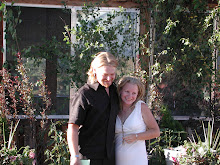The following My Free Country column appeared in Capital Press on Nov. 11, 2005. It drew lots of fan mail, and really got under the skin of some big dairy lobbyists as well.
Continually escalating concerns over livestock and poultry diseases have only made me a bigger fan of small-scale, local agriculture, (ideally) with less-crowded herds and flocks that rarely travel and are raised in healthy conditions under consumers’ watchful eyes.
Last week, I exercised my dollar vote by opting out of the milk industry, putting my trust in neighbor cows Dinah and Emily instead. Dairy has been a concern for many Americans since Recombinant Bovine Growth Hormone (a.k.a. rBGH, rBST or Posilac) came into use after Food and Drug Administration approval in 1993.
Officially there is no difference between milk from cows that have been treated with rBGH and those that have not – if you live in the United States. Canada, Australia, Japan, the European Union and the United Nations food safety organizations all officially suspect otherwise.
Oregon Physicians for Social Responsibility recently took on this battle, helping to funnel consumer complaints to the Tillamook County Creamery Association, which later banned use of the product in its member dairies.
Any woman who has nursed a baby and used a breast pump is likely to side with the cow regardless of any human health concerns. As one farmer said, “Those ladies work hard enough.”rBGH maker Monsanto and the FDA both emphatically say Posilac is safe. The FDA even suggests farmers who don’t use rBGH should cite FDA approval of the product on their hormone-free labeling. One Maine dairy added such text under legal pressure from Monsanto.
Besides all the above, I opted out of the milk industry because I wanted raw milk for the vitamins, nutrients and enzymes that can’t survive pasteurization. Plus, I was sick of driving past herds of Oregon cattle to buy milk from Texas at the local grocery store. So I went straight to Dinah and Emily.
My neighbor operates under an Oregon rule that allows owners of three cows or fewer to sell unpasteurized milk directly from the farm without a license. Unfortunately, she can’t sell at farmers’ markets, make delivery runs, advertise or sell her butter.
The Oregon Department of Agriculture’s Eric Paulson explains that the three-cow exemption is designed for the owner of a few cows to get rid of extra milk, not to run a business. The ban on transporting such milk is meant to play a “buyer beware” function so consumers see the facilities because, according to Paulson, unregulated and unpasteurized milk can be a dangerous product.
Retail sales of raw milk are otherwise banned in Oregon. California, Washington and Idaho require dairy producer and processor licenses for all milk destined for human consumption.
In Washington, small producers have been gaining ground. “For years we were seeing producers going from 100 to 1,000 cows. Now we’re seeing the opposite,” the Washington Department of Agriculture’s Claudia Coles said. Four new retail raw milk producers began this year, bringing the state total to five, and an additional five or six parties have expressed interest or have applications pending.
Attempts have been made to ease the regulatory hurdles – Coles points out that Washington now allows hand cap and bottling as well as hand milking – and all the dairy officials I spoke with were friendly and helpful. Even so, dairy laws deter many would-be suppliers.
The website www.realmilk.com provides summaries of dairy regulations by state, a list of unpasteurized and rBGH-free milk producers, and extensive health information. RealMilk would like to see raw milk sales legal in all 50 states instead of the current 28.
I have to agree. If this is the safety we can expect from dairy regulation, I long for an unsafe world where the milk flows freely. Until then, I’ll raise my glass to the intrepid milk runners out there, secretly delivering wholesome “pet milk” and selling cowshares to grateful households across the countryside.
Has a small-farm regulation got you jumping through hoops? I’d like to hear about it.
Friday, November 11, 2005
Subscribe to:
Post Comments (Atom)

No comments:
Post a Comment